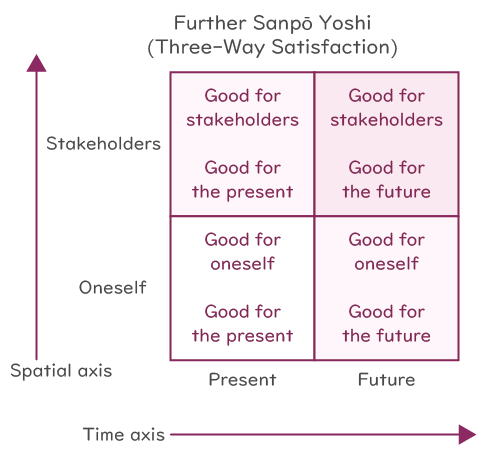Corporate philosophy is important not only for entrepreneurs in establishing a company, but also for each and every employee. For workers who are interested in pay raises (i.e., money), corporate philosophy may not be a subject of much interest, but in fact, corporate philosophy is important for employees to realize pay raises as well. (Regarding this point, the details will be addressed at another time.)
Corporate philosophy refers to the social value that should be realized. The following are examples of major social values.
-Education
-Safe water
-Medical care
-Clean energy
-Entertainment
-Gender equality
-Pleasure of food
-Abundant Nature
-Peace and justice
-Health and Welfare
-Poverty Eradication
-Reduction of Inequality
-Environmental protection
-Communication technology
-Measures against climate change
-Realization of a sanitary environment
-Job satisfaction and economic growth
-Innovation and industrial development
-Creating a Convenient and Comfortable City
In principle, every company engages in activities to create some kind of social value. It is the responsibility of the company to create social value, but self-sacrifice for this purpose is not acceptable. Self-sacrifice in this context includes not only the sacrifice of the company, but also that of its employees.
In Japan, there is a concept called “Sanpō Yoshi (meaning “Three-Way Satisfaction”)” in business. This concept refers to the idea that it is desirable for all three parties—seller, buyer, and society—to benefit through business transactions. In other words, companies are expected to provide value through their own activities to a variety of stakeholders, as follows
-Customers
-Shareholders
-Community
-Employees
-Suppliers
-Government
-Environment
+ Further “Sanpō Yoshi” (Three-Way Satisfaction)
The concept of “Sanpō Yoshi” (Three-Way Satisfaction) originated several centuries ago, but modern society increasingly values an evolved version known as “Further Sanpō Yoshi.”

In recent years, there has been growing attention to the concept of “sustainable Sanpō Yoshi (Three-Way Satisfaction),” where a favorable state for all three parties is maintained even in the future, as illustrated by this diagram.

No comments yet.